BMW iX1 vs Ford Kuga - Differences and prices compared
Compare performance (313 HP vs 243 HP), boot space and price (41800 £ vs 34200 £) at a glance. Find out which car is the better choice for you – BMW iX1 or Ford Kuga?
Costs and Efficiency:
Price and efficiency are often the first things buyers look at. Here it becomes clear which model has the long-term edge – whether at the pump, the plug, or in purchase price.
Ford Kuga has a clearly perceptible advantage in terms of price – it starts at 34200 £, while the BMW iX1 costs 41800 £. That’s a price difference of around 7586 £.
As for range, the BMW iX1 performs decisively better – achieving up to 463 km, about 395 km more than the Ford Kuga.
Engine and Performance:
Power, torque and acceleration say a lot about how a car feels on the road. This is where you see which model delivers more driving dynamics.
When it comes to engine power, the BMW iX1 has a evident edge – offering 313 HP compared to 243 HP. That’s roughly 70 HP more horsepower.
In acceleration from 0 to 100 km/h, the BMW iX1 is noticeable quicker – completing the sprint in 5.60 s, while the Ford Kuga takes 7.30 s. That’s about 1.70 s faster.
In terms of top speed, the Ford Kuga performs minimal better – reaching 200 km/h, while the BMW iX1 tops out at 180 km/h. The difference is around 20 km/h.
There’s also a difference in torque: BMW iX1 pulls significantly stronger with 494 Nm compared to 240 Nm. That’s about 254 Nm difference.
Space and Everyday Use:
Beyond pure performance, interior space and usability matter most in daily life. This is where you see which car is more practical and versatile.
Both vehicles offer seating for 5 people.
In curb weight, Ford Kuga is clearly perceptible lighter – 1526 kg compared to 1940 kg. The difference is around 414 kg.
In terms of boot space, the BMW iX1 offers a bit more room – 490 L compared to 412 L. That’s a difference of about 78 L.
In maximum load capacity, the Ford Kuga performs minimal better – up to 1534 L, which is about 39 L more than the BMW iX1.
When it comes to payload, Ford Kuga minimal takes the win – 550 kg compared to 495 kg. That’s a difference of about 55 kg.
Who comes out on top?
Overall, the BMW iX1 shows itself to be dominates this comparison and secures the title of DriveDuel Champion.
It convinces with the more balanced overall package and proves to be the more versatile choice for everyday use.
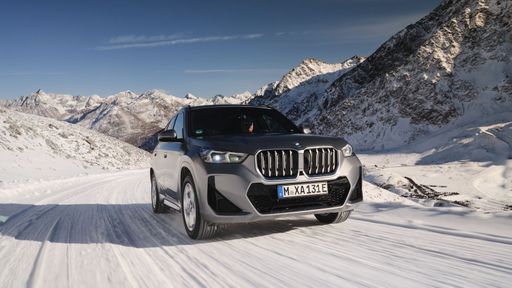
BMW iX1
Costs and Consumption
View detailed analysis
Engine and Performance
View detailed analysis
Dimensions and Body
View detailed analysis
BMW iX1
The BMW iX1 wraps BMW's electric ambition into a compact SUV package that feels unexpectedly premium, with sharp handling and a crisp, modern cabin that keeps the driver in charge. It's ideal for buyers who want a stylish, quiet daily driver with useful practicality and tech-savvy touches — plus enough character to make the commute feel less like a chore and more like a short joyride.
details
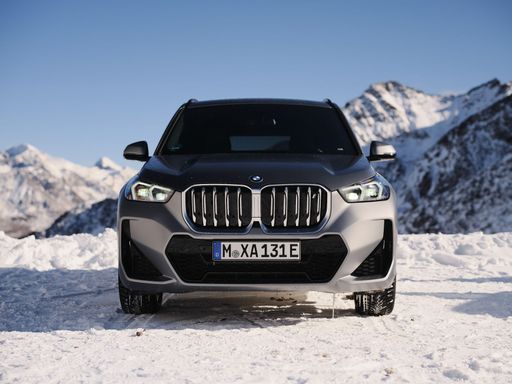
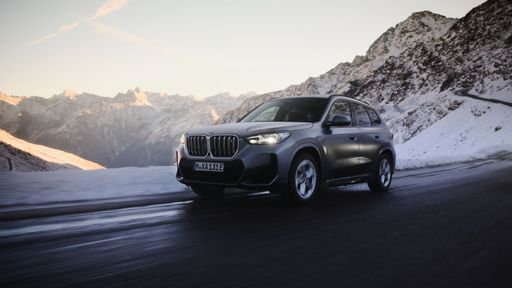
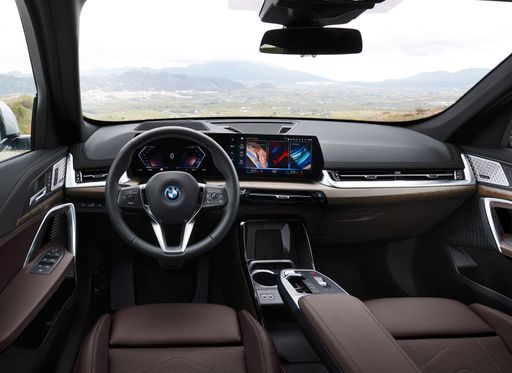
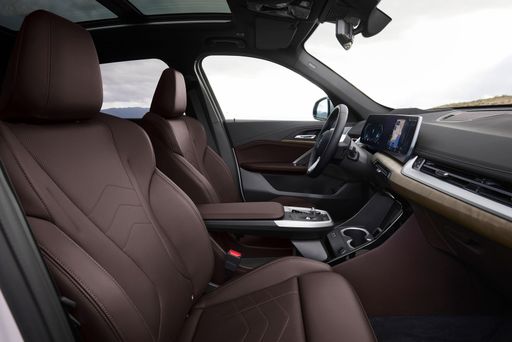
Ford Kuga
The Kuga is Ford’s adaptable family SUV that blends usable space with a surprisingly lively driving character, making daily commutes and weekend escapes equally enjoyable. With smart interior packaging, an easy-to-use infotainment setup and composed road manners, it’s a sensible choice for buyers who want a bit of fun without the fuss.
details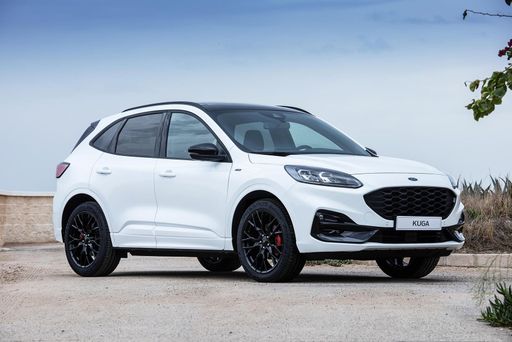
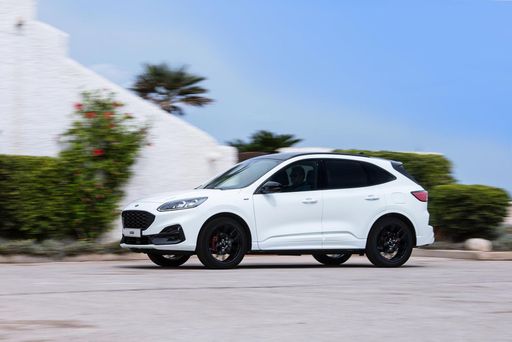


|

|
|
|
|
Costs and Consumption |
|
|---|---|
|
Price
41800 - 54600 £
|
Price
34200 - 46300 £
|
|
Consumption L/100km
-
|
Consumption L/100km
2.8 - 6.8 L
|
|
Consumption kWh/100km
15.8 - 17.1 kWh
|
Consumption kWh/100km
-
|
|
Electric Range
436 - 463 km
|
Electric Range
68 km
|
|
Battery Capacity
64.80 kWh
|
Battery Capacity
1.1 - 14.4 kWh
|
|
co2
0 g/km
|
co2
55 - 154 g/km
|
|
Fuel tank capacity
-
|
Fuel tank capacity
42 - 54 L
|
Dimensions and Body |
|
|---|---|
|
Body Type
SUV
|
Body Type
SUV
|
|
Seats
5
|
Seats
5
|
|
Doors
5
|
Doors
5
|
|
Curb weight
1940 - 2085 kg
|
Curb weight
1526 - 1859 kg
|
|
Trunk capacity
490 L
|
Trunk capacity
412 L
|
|
Length
4500 mm
|
Length
4604 - 4645 mm
|
|
Width
1845 mm
|
Width
1882 mm
|
|
Height
1616 mm
|
Height
1673 - 1681 mm
|
|
Max trunk capacity
1495 L
|
Max trunk capacity
1534 L
|
|
Payload
495 kg
|
Payload
541 - 550 kg
|
Engine and Performance |
|
|---|---|
|
Engine Type
Electric
|
Engine Type
Petrol, Full Hybrid, Plugin Hybrid
|
|
Transmission
Automatic
|
Transmission
Manuel, Automatic
|
|
Transmission Detail
Reduction Gearbox
|
Transmission Detail
Manual Gearbox, CVT, Automatic Gearbox
|
|
Drive Type
Front-Wheel Drive, All-Wheel Drive
|
Drive Type
Front-Wheel Drive, All-Wheel Drive
|
|
Power HP
204 - 313 HP
|
Power HP
150 - 243 HP
|
|
Acceleration 0-100km/h
5.6 - 8.6 s
|
Acceleration 0-100km/h
7.3 - 9.9 s
|
|
Max Speed
170 - 180 km/h
|
Max Speed
195 - 200 km/h
|
|
Torque
250 - 494 Nm
|
Torque
240 Nm
|
|
Number of Cylinders
-
|
Number of Cylinders
3 - 4
|
|
Power kW
150 - 230 kW
|
Power kW
111 - 178 kW
|
|
Engine capacity
-
|
Engine capacity
1496 - 2488 cm3
|
General |
|
|---|---|
|
Model Year
2022 - 2023
|
Model Year
2025
|
|
CO2 Efficiency Class
A
|
CO2 Efficiency Class
E, D, B
|
|
Brand
BMW
|
Brand
Ford
|
Is the BMW iX1 offered with different drivetrains?
The BMW iX1 is available as Front-Wheel Drive or All-Wheel Drive.
The prices and data displayed are estimates based on German list prices and may vary by country. This information is not legally binding.
